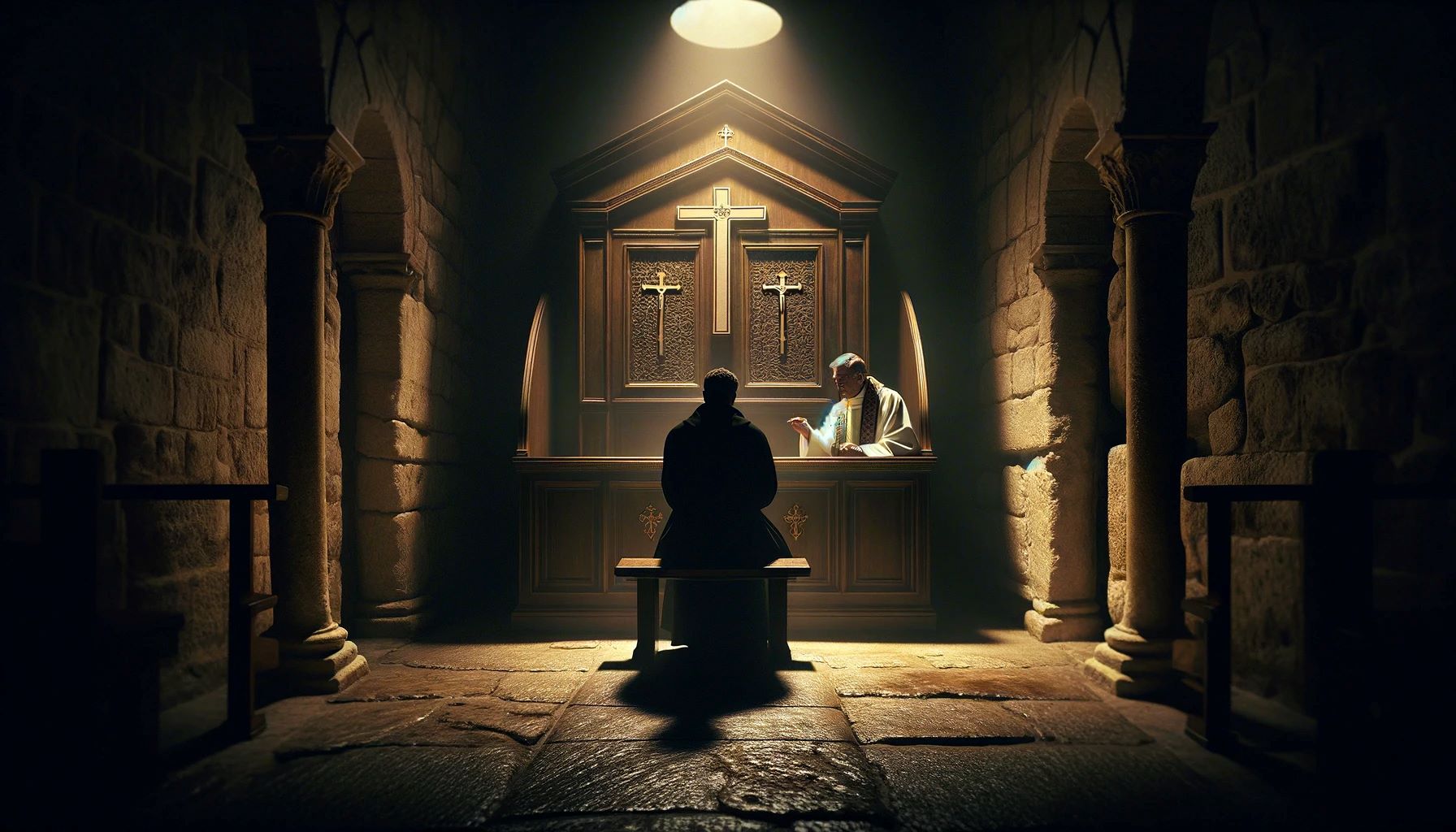Home>Christian Life>What Is A First Confession


Christian Life
What Is A First Confession
Published: March 4, 2024
Peter Smith, Editorial Director at Christian.net, combines deep insights into faith, politics, and culture to lead content creation that resonates widely. Awarded for his contributions to religious discourse, he previously headed a major organization for religious communicators, enhancing dialogue on faith's societal impacts.
Learn about the significance and process of a first confession in the Christian life. Understand the importance of this sacrament and its role in spiritual growth.
(Many of the links in this article redirect to a specific reviewed product. Your purchase of these products through affiliate links helps to generate commission for Christian.net, at no extra cost. Learn more)
Table of Contents
The Importance of First Confession
First Confession, also known as the Sacrament of Penance or Reconciliation, holds significant importance in the Catholic faith. It is the first opportunity for individuals to confess their sins and seek forgiveness from God. This sacrament marks the beginning of a lifelong journey of spiritual growth and renewal, allowing individuals to experience the grace and mercy of God in a profound way.
-
Spiritual Cleansing: First Confession provides a chance for individuals to cleanse their souls and start anew. By confessing their sins, they acknowledge their faults and seek reconciliation with God, paving the way for spiritual healing and renewal.
-
Forgiveness and Grace: Through the act of confessing one's sins, individuals receive the forgiveness and grace of God. This experience of divine mercy brings about a sense of peace and freedom from the burden of sin, allowing individuals to move forward with a renewed sense of purpose and faith.
-
Personal Responsibility: First Confession encourages individuals to take personal responsibility for their actions and their impact on others. It fosters a sense of accountability and encourages self-reflection, leading to personal growth and a deeper understanding of one's relationship with God and others.
-
Reconciliation with the Church: By participating in First Confession, individuals are reconciled with the Church community. This sacrament reinforces the communal aspect of the Catholic faith, emphasizing the importance of seeking forgiveness not only from God but also from the wider Christian community.
-
Preparation for the Eucharist: First Confession is often a prerequisite for receiving the Sacrament of the Eucharist. By participating in this sacrament, individuals prepare themselves to receive the body and blood of Christ in the Eucharist, deepening their connection to the central sacrament of the Catholic faith.
In summary, First Confession holds immense significance in the life of a Catholic believer. It serves as a pivotal moment of spiritual cleansing, forgiveness, and reconciliation, laying the foundation for a deeper relationship with God and the Christian community. This sacrament marks the beginning of a lifelong journey of faith and personal growth, shaping the spiritual identity of individuals within the Catholic tradition.
Read more: How To Do A First Confession
The Process of First Confession
The process of First Confession involves several key steps that guide individuals through the sacrament of Penance or Reconciliation. Understanding the process can help individuals prepare for this significant spiritual experience and approach it with reverence and sincerity.
-
Examination of Conscience: Before participating in First Confession, individuals are encouraged to engage in an examination of conscience. This involves reflecting on their thoughts, words, and actions, and identifying any sins or shortcomings that may have distanced them from God and others. This introspective process prepares individuals to make a sincere and thorough confession of their sins.
-
Preparation and Guidance: In many cases, individuals preparing for First Confession receive guidance and instruction from their parents, guardians, or religious educators. They may be provided with resources such as examination of conscience guides and prayers to help them prepare for the sacrament. This preparatory phase aims to ensure that individuals approach First Confession with a clear understanding of its significance and purpose.
-
Confession to a Priest: During the sacrament of First Confession, individuals have the opportunity to confess their sins to a priest in the presence of God. The priest serves as a compassionate listener and a representative of God's mercy, offering guidance and support to those seeking reconciliation. Individuals are encouraged to honestly and humbly confess their sins, expressing genuine remorse and a desire for forgiveness.
-
Act of Contrition: Following the confession of sins, individuals are invited to recite an act of contrition, expressing their sorrow for having offended God and their commitment to avoiding sin in the future. This prayer serves as a heartfelt expression of repentance and a reaffirmation of one's desire to live in accordance with the teachings of the Church.
-
Absolution and Penance: Upon hearing the confession and act of contrition, the priest offers absolution, imparting God's forgiveness and mercy upon the individual. The priest may also assign a penance, which typically involves prayers or acts of charity, as a means of expressing genuine contrition and making amends for one's sins.
-
Reception of God's Grace: Through the sacrament of First Confession, individuals receive the grace of God, experiencing spiritual healing and renewal. This transformative encounter with divine mercy brings about a sense of peace and reconciliation, allowing individuals to move forward with a renewed commitment to living a virtuous and faithful life.
The process of First Confession is a deeply meaningful and transformative experience that allows individuals to seek forgiveness, receive God's grace, and embrace a renewed sense of spiritual wholeness. It serves as a pivotal moment in the faith journey of Catholic believers, fostering a deeper connection to God and the Christian community.
Preparation for First Confession
Preparation for First Confession is a crucial aspect of the sacramental journey for individuals within the Catholic faith. It involves a thoughtful and intentional process aimed at helping participants approach the sacrament with reverence, sincerity, and a clear understanding of its significance. The following steps and considerations are integral to the preparation for First Confession:
-
Guidance and Instruction: Individuals preparing for First Confession often receive guidance and instruction from their parents, guardians, or religious educators. This guidance may include explanations of the sacrament's purpose, the significance of seeking forgiveness, and the role of the priest in the confession process. It also involves providing resources such as examination of conscience guides, prayers, and examples of acts of contrition to help individuals prepare for the sacrament.
-
Examination of Conscience: A fundamental aspect of preparing for First Confession is engaging in an examination of conscience. This process involves reflecting on one's thoughts, words, and actions, and identifying any sins or shortcomings that may have distanced the individual from God and others. It encourages introspection and self-awareness, helping individuals recognize areas where they may have fallen short of living according to the teachings of the Church.
-
Understanding Sin and Forgiveness: As part of the preparation, individuals are encouraged to deepen their understanding of sin and forgiveness within the context of the Catholic faith. They learn about the different types of sin, the concept of contrition, and the transformative power of seeking reconciliation with God and the Church. This understanding helps individuals approach the sacrament with a genuine desire for spiritual healing and renewal.
-
Prayer and Reflection: Preparation for First Confession often involves engaging in prayer and reflection. Individuals are encouraged to spend time in prayer, seeking God's guidance and strength as they prepare to confess their sins. Reflection on their actions and their impact on others fosters a sense of accountability and a genuine desire for reconciliation with God and the Christian community.
-
Role of the Family: The family plays a significant role in preparing children for their First Confession. Parents and guardians provide support, encouragement, and a nurturing environment for children to understand the sacrament's significance. They may engage in discussions about the importance of seeking forgiveness, share personal experiences of confession, and accompany their children in the process of examination of conscience and prayer.
-
Reception of the Sacrament of Reconciliation: In some cases, individuals may have the opportunity to participate in the sacrament of Reconciliation before their First Confession. This experience allows them to become familiar with the confession process, receive guidance from a priest, and gain a deeper understanding of the sacrament's transformative power.
Preparation for First Confession is a formative and spiritually enriching process that equips individuals with the necessary understanding and disposition to approach the sacrament with sincerity and humility. It lays the foundation for a meaningful experience of seeking forgiveness, receiving God's grace, and embracing a renewed commitment to living a virtuous and faithful life within the Catholic tradition.
The Role of the Priest in First Confession
The priest plays a pivotal role in the sacrament of First Confession, serving as a compassionate listener, a guide, and a representative of God's mercy. Their role is multifaceted, encompassing pastoral care, spiritual guidance, and the administration of the sacrament. Here's a detailed look at the significant role of the priest in First Confession:
-
Compassionate Listener: During First Confession, the priest assumes the role of a compassionate listener, creating a safe and non-judgmental space for individuals to confess their sins. They offer a listening ear, demonstrating empathy and understanding as individuals express their shortcomings and seek reconciliation with God.
-
Spiritual Guide: The priest serves as a spiritual guide, offering counsel and support to individuals as they navigate the process of examining their conscience and acknowledging their sins. They provide gentle guidance, helping individuals reflect on their actions, understand the impact of their choices, and discern a path toward spiritual renewal.
-
Minister of God's Mercy: As a minister of God's mercy, the priest embodies the compassionate and forgiving nature of God. Through the sacrament of First Confession, the priest extends God's forgiveness and absolution to individuals, imparting a profound sense of grace and reconciliation.
-
Confessor and Absolver: In the confessional, the priest acts as the confessor, receiving the sincere confession of sins from individuals. They then offer absolution, pronouncing God's forgiveness and reconciling the individual with God and the Church. This act of absolution is a powerful moment of spiritual healing and renewal for the penitent.
-
Teacher and Counselor: The priest also assumes the role of a teacher and counselor, providing instruction on the sacrament of First Confession, the significance of seeking forgiveness, and the importance of living a virtuous life. They offer pastoral counsel, encouraging individuals to embrace a life of faith, love, and reconciliation with God and others.
-
Assigner of Penance: Following the confession of sins and the reception of absolution, the priest assigns a penance to the individual. This penance serves as a tangible expression of contrition and a means of making amends for one's sins. The priest's guidance in performing the assigned penance fosters a deeper commitment to spiritual growth and renewal.
-
Witness to Transformation: Through their role in First Confession, the priest becomes a witness to the transformative power of God's grace in the lives of individuals. They accompany penitents on their journey of seeking forgiveness, experiencing reconciliation, and embracing a renewed sense of spiritual wholeness.
The role of the priest in First Confession is characterized by compassion, guidance, and the sacramental ministry of reconciliation. Their presence and pastoral care create an environment where individuals can encounter the mercy of God, experience spiritual healing, and embark on a path of renewed faith and virtue within the Catholic tradition.
Common Questions and Concerns about First Confession
-
What if I forget a sin during confession?
It's natural to feel concerned about forgetting a sin during confession. Rest assured that if you forget to confess a sin, it is still forgiven if it was not intentionally withheld. Simply mention it during your next confession. -
What if I feel nervous or embarrassed during confession?
Feeling nervous or embarrassed about confessing your sins is common. Remember that the priest is there to offer support and guidance, and the sacrament is a confidential and non-judgmental space for seeking forgiveness. -
How do I know what to confess?
If you're unsure about what to confess, an examination of conscience guide can help you reflect on your thoughts, words, and actions. It's important to confess any sins that weigh on your conscience and have distanced you from God and others. -
What if I haven't been to confession in a long time?
If it has been a long time since your last confession, it's okay to feel apprehensive. The priest is there to help you through the process, and you can express your concerns to them. Remember that the sacrament is about seeking reconciliation and renewal. -
Can I bring a list of my sins to confession?
Bringing a list of your sins to confession can be helpful, especially if you're worried about forgetting something. However, it's important to approach the sacrament with a sincere heart and a genuine desire for forgiveness. -
What if I feel unworthy of God's forgiveness?
It's common to struggle with feelings of unworthiness, but it's important to remember that God's mercy is boundless. The sacrament of First Confession is a powerful opportunity to experience God's love and forgiveness, regardless of our perceived worthiness. -
What if I have committed a serious sin?
If you have committed a serious sin, it's important to confess it during First Confession. The priest is there to offer guidance and support, and through the sacrament, you can receive God's forgiveness and grace, no matter the gravity of the sin. -
How often should I go to confession after my First Confession?
After your First Confession, it is recommended to participate in the sacrament of Penance regularly, especially when you have committed serious sins. Regular confession helps maintain a healthy spiritual life and fosters ongoing reconciliation with God and the Church.
Addressing common questions and concerns about First Confession can help individuals approach the sacrament with greater understanding, confidence, and a deeper sense of spiritual readiness.















